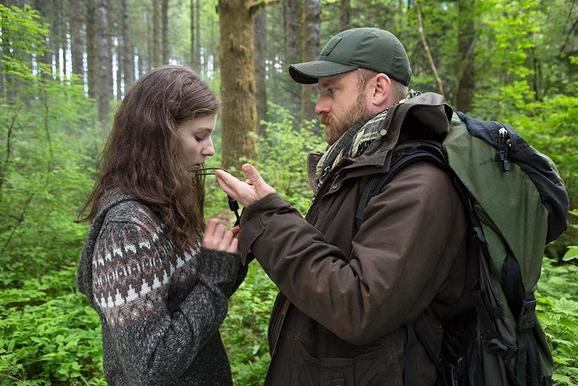LEAVE NO TRACE
****
Director: Debra Granik
Screenwriters: Debra Granik and Anne Rosellini, based on the novel My Abandonment by Peter Rock.
Principal cast:
Thomasin Harcourt McKenzie
Ben Foster
Jeff Kober
Dale Dickie
Isaiah Stone
Country: USA
Classification: G
Runtime: 109 mins.
Australian release date: 30 August 2018
Previewed at: Sony Pictures Theatrette, Sydney, on 14 August 2018.
Set in the sylvan territory of Oregon, Debra Granik’s Leave No Trace is a contemporary tale of survival and the strong bond between a war veteran father, Will (Ben Foster), who’s battling PTSD, and his 13-year-old daughter, Tom (Thomasin Harcourt McKenzie). The couple are living ‘off the grid’ in the forest surrounding Portland, surviving the cold temperatures and rough existence with skill, and only occasionally taking a hike into town to replenish their provisions. Their relationship is one of love and mutual respect as they go about their daily business in a calm and deliberate manner, hiding from the authorities and lumberjacks who comb the area. Granik has form dealing with outsider communities - her gritty 2010 film Winter’s Bone was set amongst hillbilly families living in the Ozark Mountains - and she does it well. She’s also excellent at spotting talent. Winter’s Bone introduced a wide audience to the talent of Jennifer Lawrence and Leave No Trace will likely do the same for young Thomasin Harcourt McKenzie.
Will is completely at home living in the woods as we follow him collecting fresh water, lighting fires with a large flint that hangs around his neck, foraging for food and generally relying on his wits and the training he would have learnt in the armed forces. Tom is an intelligent girl, home-schooled by Will, who contributes to their daily routine in a studied, efficient manner, quietly observing all her dad’s practices. You sense that she, too, is comfortable in their surroundings, even though she is aware of its exigencies. One day their idyll is suddenly shattered when their camp is raided and they are taken into social welfare custody. Although the authorities handle the pair with great sensitivity and compassion, it is evident that Ben, in particular, feels caged by any kind of walls and the scrutiny of others. Even the provision of housing on the isolated rural property of a kindly employer, Mr. Walters (Jeff Kober), is too much of a bond for him, so he gathers up their few belongings and heads off with Tom back into the woods. On the run, they eventually come across a group of like-minded people, a community of outsiders living in trailers and rough-hewn houses who’ve turned their back on modern America and returned to a simpler time. Here, Tom begins to feel the warmth of human companionship that’s been missing from her life until then, something she increasingly needs to embrace, and she becomes friendly with an older woman, Dale (Dale Dickie). The question is, will this existence suit both Will and Tom, considering their different personalities, ages and needs?
Granik’s film shows us that there is a large number of people who have returned from the various wars the USA has engaged in over recent decades who have found life as they once lived it simply not doable any more; the stresses of conflict have affected them too much. They’ve found that one way to cope is to remove themselves from society and hightail to an environment that guarantees solitude, away from the glare of authority and the rigidness of an urban environment. Granik and Rosellini’s screenplay compassionately shines a light on these forgotten people and Ben Foster’s quiet portrayal of the troubled Will illustrates them well. Harcourt McKenzie is a revelation as Tom, wise beyond her years, who’s love for her father is tested to the limit. Also revelatory are the magnificent wilderness locations in Oregon, entrancingly captured by Michael McDonough’s cinematography. Leave No Trace is compelling viewing, made even more so by knowing that it’s based on a true story. It is a deeply affecting work.
